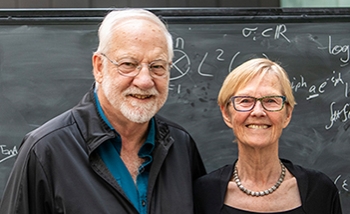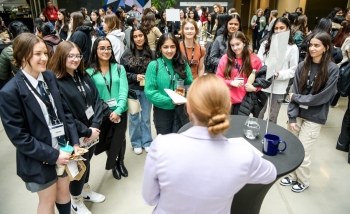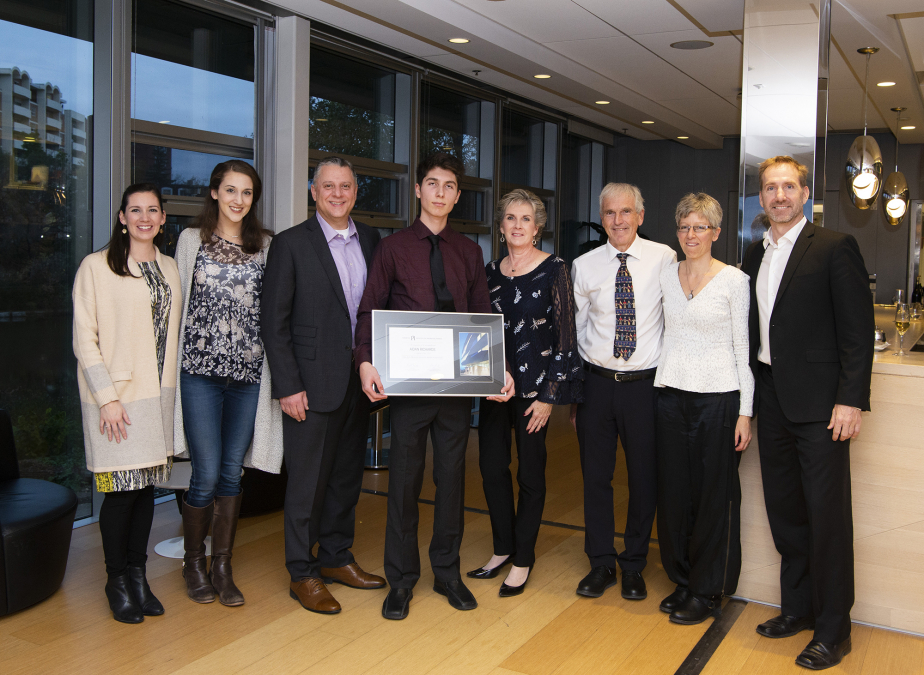Before he was old enough to access the internet, Aidan Richards would pepper his parents with a barrage of questions about why the world is the way it is. His parents, both teachers, would do their best to answer. Often, they would have a solid explanation for the first question, but by the fifth or sixth follow-up question, they would inevitably be at a loss.
“I had a general sense of just wanting to know everything,” Richards says. “But I think that was crucial – not getting all the answers. It was crucial to driving my curiosity.”
Looking back, Richards recalls that many of his questions had to do with very fundamental issues in physics. “I didn’t understand what a force was, and how it related to energy. It turns out to be the simplest relationship, but I remember a lot of my questions were tied to that.”
Richards’ enthusiasm for physics, combined with high academic achievements and a busy roster of athletics commitments and volunteer activities, has earned him this year’s Luke Santi Memorial Award for Student Achievement. The award is presented annually to a Canadian postsecondary student who embodies the qualities of Luke Santi, a high school student and friend of Perimeter who had a passion for research and discovery, earning top marks while volunteering his time in service of others.
Growing up in the small Ontario town of Mono, Richards filled much of his time watching science TV shows and documentaries, feeding his insatiable curiosity.
“I remember being amazed that there was an entire subject area – physics – devoted to what I was interested in,” he says. “I would always lean forward in my seat whenever physics was talked about.”
In addition to physics, Richards has also cultivated a love of ecology and the outdoors. During high school, he planted trees to restore deforested areas, participated in invasive species removal, and monitored the health of fish in the Credit River via electrofishing (a common scientific survey method that involves temporarily – and harmlessly – stunning fish so they can be measured and released).
Why work so hard to preserve and improve the environment? For one thing, he spends a good deal of time outside while cross-country running, doing track and field, and Nordic skiing. He lauds running in particular as an activity that complements physics in many ways.
“I feel like there is a bit of a personality overlap between runners and physicists,” he says. “There’s an element of simplicity to running that I like. There’s a lot to it, but it’s a very simple goal, in the same way that physics is a very simple goal of understanding the universe – and yet, once you break it down, there are a lot of elements to it.”
Now 18 and a first-year student at Queen’s University, Richards has noticed that the grit and mental endurance needed to tackle tough physics problem sets are the same characteristics he’s developed through athletics. “You have the final, say, 500 metres of a race, where you’re grinding, you’re in pain, you want to give up – but there’s a mental aspect that allows you to push through.”
Receiving the Luke Santi Memorial Award came as a very welcome surprise for Richards, who aspires to turn his lifelong interest into a career as a theoretical physicist. “I’m sure there were a huge number of people that deserved to get it, but I really felt this one closely aligned with who I am, which made it all the more special,” says Richards.
If his dream of becoming a theoretical physicist doesn’t pan out, Richards already has a backup plan: to start a company that would supply affordable solar panels. But what would make him happiest – the big goal he is chasing – is uncovering answers to questions we aren’t even asking yet.
“That’s really the goal of physics – to bring two seemingly separate elements together and discover that they have the same underlying principles. If I were to contribute to the unification of any two things, I would be overjoyed,” he says.
“Even the smallest contributions to our knowledge of the workings of the universe would be very fulfilling.”
About PI
Perimeter Institute is the world’s largest research hub devoted to theoretical physics. The independent Institute was founded in 1999 to foster breakthroughs in the fundamental understanding of our universe, from the smallest particles to the entire cosmos. Research at Perimeter is motivated by the understanding that fundamental science advances human knowledge and catalyzes innovation, and that today’s theoretical physics is tomorrow’s technology. Located in the Region of Waterloo, the not-for-profit Institute is a unique public-private endeavour, including the Governments of Ontario and Canada, that enables cutting-edge research, trains the next generation of scientific pioneers, and shares the power of physics through award-winning educational outreach and public engagement.
You might be interested in




